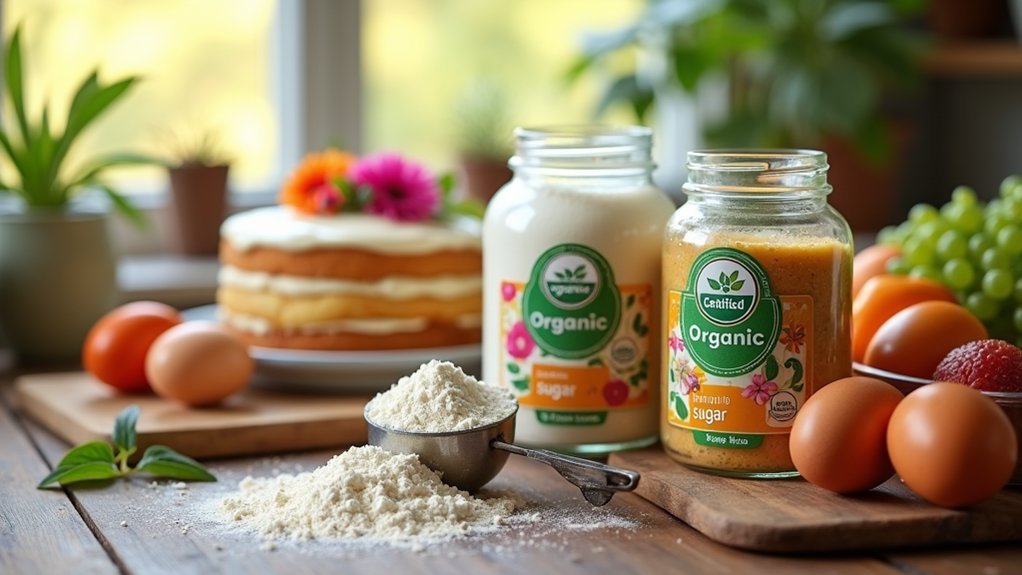The Most Trusted Organic Certifications for Cake Bakers
When it comes to reliable organic certifications for cake bakers, the USDA Organic label stands out, as it adheres to strict standards. Look for terms like “100% Organic,” “Organic,” and “Made with Organic,” as these indicate different percentages of organic ingredients. Additionally, certifications such as Fairtrade, Non-GMO Project Verified, and vegan labels strengthen your ingredient sourcing credibility. These certifications not only increase consumer trust but also highlight a commitment to sustainability. Familiarising yourself with these certification types can enhance your understanding of quality ingredients for your baked goods.
Key Takeaways
- The USDA Organic Certification ensures compliance with strict organic standards, making it a reliable choice for cake bakers who prioritise high-quality ingredients.
- The Non-GMO Project Verified seal confirms that ingredients are free from genetically modified organisms, boosting consumer trust in cake products.
- Fairtrade Certification supports ethically sourced ingredients, appealing to socially conscious customers and enhancing the reputation of cake bakers.
- Gluten-free certification assures customers of allergen safety, catering to specific dietary needs and expanding the customer base for cake bakers.
- Regenerative Organic Certified (ROC) promotes soil health and ethical treatment of animals, aligning with sustainable practices valued by environmentally conscious cake bakers.
Understanding Organic Certifications
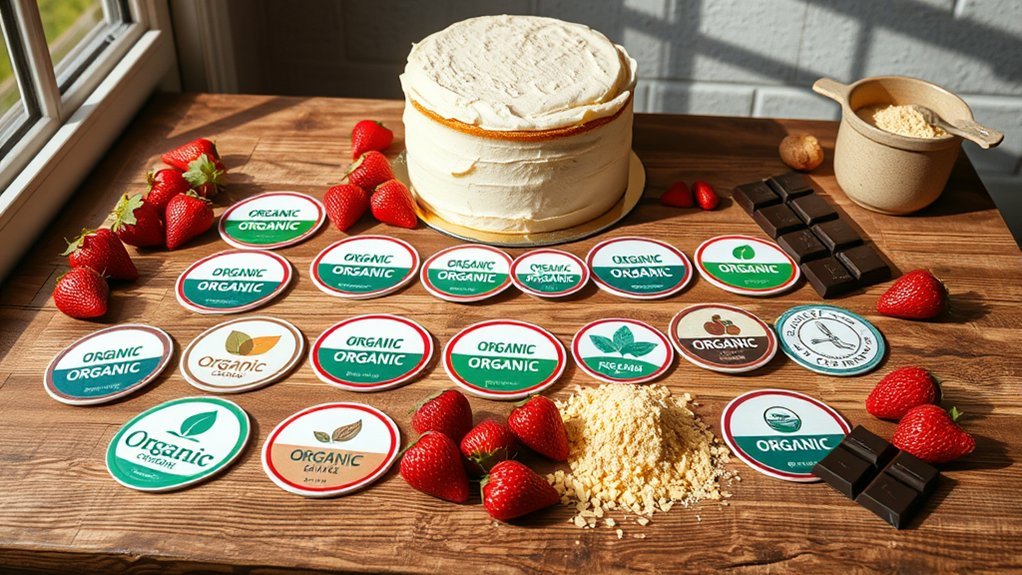
Understanding organic certifications is crucial for cake bakers wanting to enter the expanding market for organic products.
It’s important to know that gaining certification involves following specific organic practices, submitting applications, and undergoing annual inspections. Adhering to UK organic standards is essential, as these regulations allow you to label your products as organic. Certifying bodies, such as the Soil Association, enforce these standards, which can vary by region. Remember, there’s typically a conversion period of 2-3 years before you achieve full certification. Additionally, compliance with third-party certification ensures that your processes meet established organic standards, further enhancing consumer confidence. Understanding the certification process can help bakers navigate the complexities of organic compliance. Keeping thorough records and following strict protocols can significantly boost transparency and build consumer trust in your organic cakes.
The Importance of USDA Organic Certification
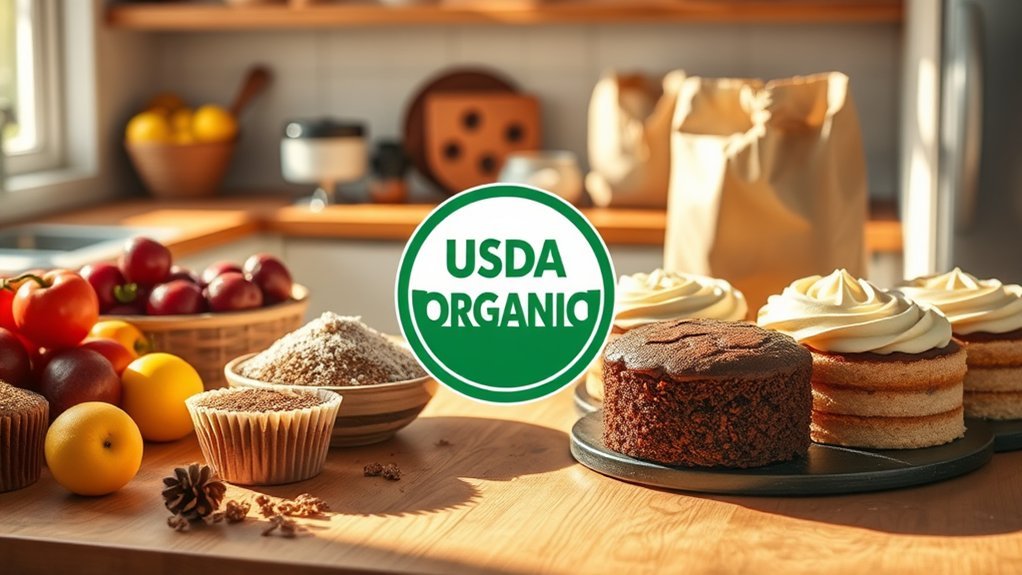
Understanding the importance of USDA Organic Certification is crucial for your cake baking business. This certification sets out a clear process for compliance and labelling, while also emphasising the health and environmental benefits of organic practices. By ensuring that your ingredients adhere to USDA organic standards, you not only enhance the quality of your cakes but also build trust with health-conscious consumers. Additionally, using organic ingredients may lower the risk of chronic diseases, further appealing to a health-focused market.
Certification Process Overview
Navigating the certification process for USDA Organic Certification is essential for cake bakers who wish to meet organic standards. The process involves several key steps: submitting an application, creating an Organic System Plan (OSP), implementing this plan, undergoing an inspection, and receiving a certification decision. Additionally, achieving certification can enhance your business by attracting health-conscious consumers who seek organic options. You may encounter challenges, such as ensuring compliance with stringent regulations, including the prohibition of synthetic chemicals and GMOs. It’s crucial to maintain detailed records of your practices for traceability and verification. Additionally, keep in mind that certification isn’t a one-off task; it requires annual renewal through updated documentation and inspections. By successfully navigating this process, you not only build consumer trust but also place your cakes in a thriving organic market. This certification process ensures compliance with organic standards and enhances the credibility of your brand in the competitive organic landscape.
Labeling Requirements Explained
When navigating the organic certification landscape, cake bakers need to pay close attention to labelling requirements.
These labels are crucial for ensuring transparency and building consumer trust. Clear labelling is essential; the USDA Organic seal signifies adherence to strict standards, informing customers about the absence of synthetic pesticides and GMOs.
Your products must clearly indicate whether they’re “100% Organic,” “Organic,” or “Made with Organic,” accurately reflecting the percentage of organic ingredients. Each label must receive approval from a USDA-accredited certifying agent, highlighting the importance of compliance with regulations.
Health and Environmental Benefits
Organic certifications boost product credibility and provide substantial health and environmental benefits for cake bakers and their customers.
By opting for USDA Organic ingredients, you minimise exposure to harmful pesticides and synthetic additives, which is essential for your clients’ health. Organic products typically contain higher nutrient levels and offer allergen-free options, making them safer for those with sensitivities.
Environmentally, organic farming helps conserve soil and water, supports biodiversity, and employs sustainable methods. These practices enhance soil health and aid carbon sequestration.
Key Regulatory Bodies in Organic Standards
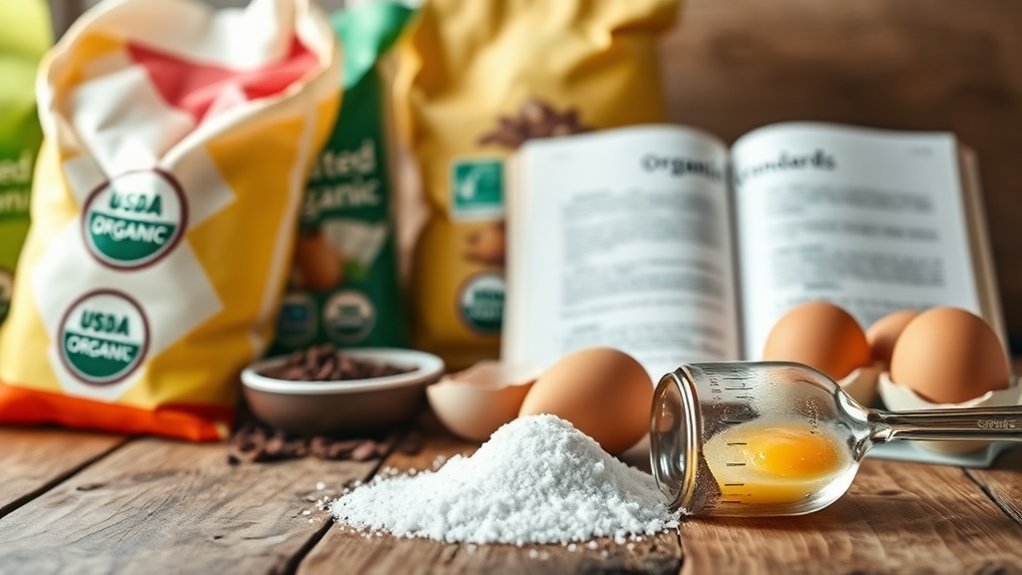
Navigating the realm of organic certifications requires a solid understanding of key regulatory bodies.
In the UK, the Soil Association and the Organic Trade Board play crucial roles in establishing organic standards. These organisations ensure that producers, including bakers, adhere to compliance requirements.
USDA Organic Program
The USDA Organic Programme is essential for setting organic standards in the United States, ensuring that products comply with strict regulations. Here are the key components:
- Certification Process: Accredited bodies manage the certification, ensuring products meet USDA guidelines.
- Eligibility Criteria: To carry the “organic” label, products must contain at least 95% organic ingredients, promoting adherence to organic standards.
- Enforcement Actions: Those who violate regulations may face penalties or loss of certification, which helps maintain consumer trust.
As the organic market grows, understanding these elements helps you make informed choices.
The USDA Organic seal not only boosts your product’s credibility but also reassures customers about the quality of their food.
National Organic Standards Board
Navigating organic certifications? Understanding the National Organic Standards Board (NOSB) is key. This advisory body advises the U.S. Secretary of Agriculture on organic food and product policies, ensuring they maintain organic integrity.
The NOSB comprises 15 members, including organic farmers and consumer advocates, who craft recommendations that define standards for production, handling, and processing.
By reviewing the National List of Allowed and Prohibited Substances, the board upholds strict ingredient standards vital for organic bakeries. Despite regulatory hurdles, the NOSB prioritises transparency and public involvement, fostering consumer trust.
Ultimately, their recommendations significantly influence the growth and accountability of the organic bakery sector.
Types of Organic Labels Explained
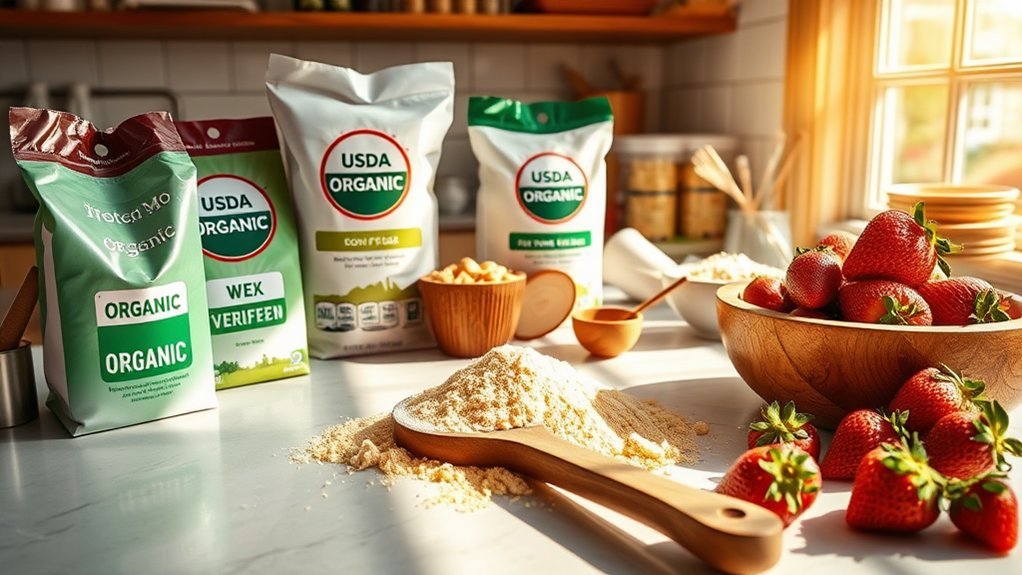
Understanding the different types of organic labels is vital for cake bakers and consumers alike. Knowing these labels can improve your sourcing of organic ingredients and help you tackle certification challenges. Here’s a simple guide:
- 100% Organic: This means the product contains only organic ingredients, excluding water and salt.
- Organic: This includes at least 95% organic ingredients, with the rest coming from the USDA’s National List.
- Made with Organic: This label indicates that over 70% of the ingredients are organic.
Each label comes with its own certification requirements. The USDA Organic Seal shows that the product meets strict standards, ensuring it’s free from GMOs and synthetic pesticides.
Trusted Certifications for Cake Ingredients
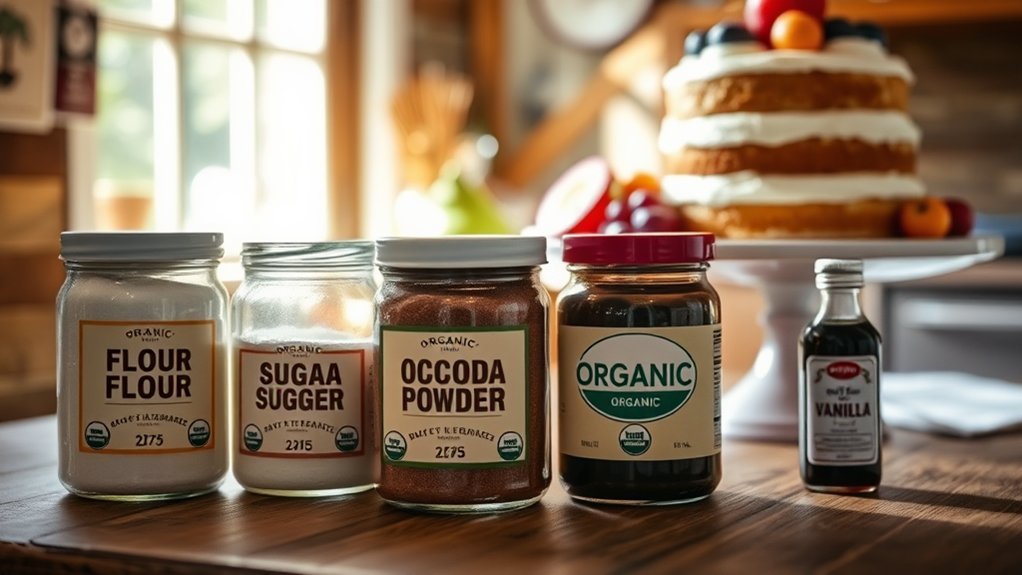
Navigating organic certifications can greatly influence your baking, especially when sourcing top-quality ingredients. Familiarising yourself with trusted certifications like USDA Organic, Ecocert, and Non-GMO Verification can clear up common misconceptions.
For example, USDA Organic ensures that at least 95% of your ingredients are organic, which aligns with today’s consumer preferences. Fairtrade Certification is also important, particularly for ethically sourced ingredients like sugar.
Choosing gluten-free certified products guarantees allergen safety, which is vital for many customers. By incorporating organic flours, eggs, and baking powder, you not only enhance the flavour of your recipes but also build trust with your customers.
These certifications elevate your baking while promoting responsible and sustainable ingredient sourcing.
Regenerative Organic Certified (ROC) Overview
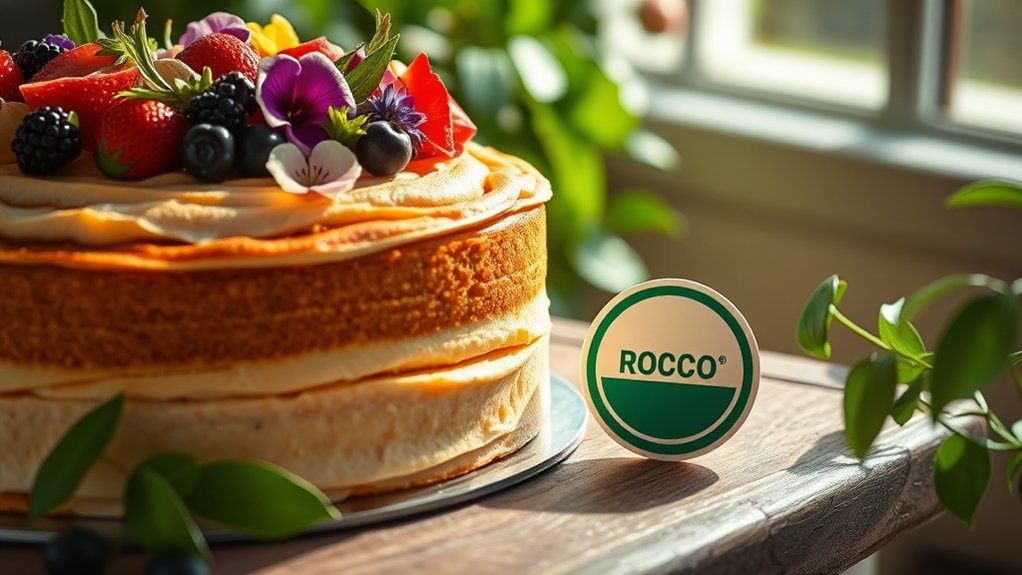
Regenerative Organic Certified (ROC) represents a significant advancement in organic farming, raising the bar beyond standard organic certification.
This certification not only meets USDA NOP Organic standards but also encourages practices that positively impact the environment and local communities.
Here are three key advantages of ROC certification:
- Enhanced Soil Health: ROC boosts soil biodiversity, essential for robust ecosystems.
- Animal Welfare: It ensures ethical treatment and living conditions for farm animals.
- Fair Treatment for Farmworkers: ROC advocates for fair labour practices, respecting the rights and dignity of agricultural workers.
The Role of Non-GMO Verification
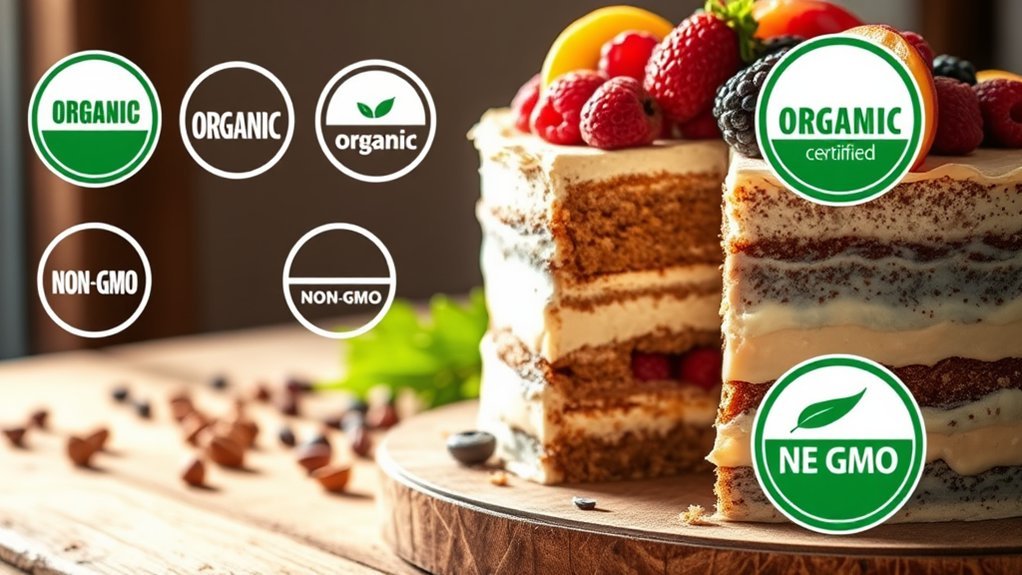
Non-GMO verification is crucial in the cake baking industry, ensuring that all ingredients are free from genetically modified organisms.
As a baker, it’s important to source non-GMO ingredients like flour and oils to cater to the increasing consumer demand for transparency and health.
Brands such as King Arthur Flour highlight the market’s preference for verified products, with many consumers recognising the Non-GMO Project Verified seal.
This verification not only fosters consumer trust but also helps your brand stand out in a competitive landscape.
Benefits of Vegan and Dairy-Free Certifications

Choosing vegan and dairy-free certifications can significantly broaden your customer base, appealing to those with specific dietary needs.
By offering these options, you promote healthier choices, such as lowering cholesterol and boosting nutrient intake, while also catering to individuals with lactose intolerance or allergies.
This approach not only enhances your brand’s attractiveness but also shows your commitment to accommodating diverse dietary preferences.
Dietary Inclusivity Benefits
In the varied landscape of dietary preferences, vegan and dairy-free certifications provide valuable benefits for cake bakers looking to be inclusive. By adopting these certifications, you can:
- Cater to dietary needs, offering tasty options for vegans and those with lactose intolerance.
- Minimise the risk of cross-contamination, ensuring greater awareness and safety for those with allergies.
- Promote healthier eating habits with delicious plant-based alternatives.
These advantages not only broaden your customer base but also enhance your brand’s reputation as a responsible business.
Health Conscious Choices
Embracing vegan and dairy-free certifications can significantly boost your cake baking business by appealing to health-conscious consumers.
By using plant-based ingredients, you can lower cholesterol levels with healthier fats like coconut oil and improve gut health with fibre-rich nuts and seeds. Research shows that vegans have a 32% lower risk of heart disease, making vegan baking a wise choice for health-focused customers.
Additionally, opting for whole grains instead of refined flours enhances nutritional value. As the demand for vegan options rises, your commitment to health and sustainability will attract a broader audience while supporting ethical practices.
Ultimately, these certifications enable you to serve your community with care and intent.
Key Organic Ingredients for Baking
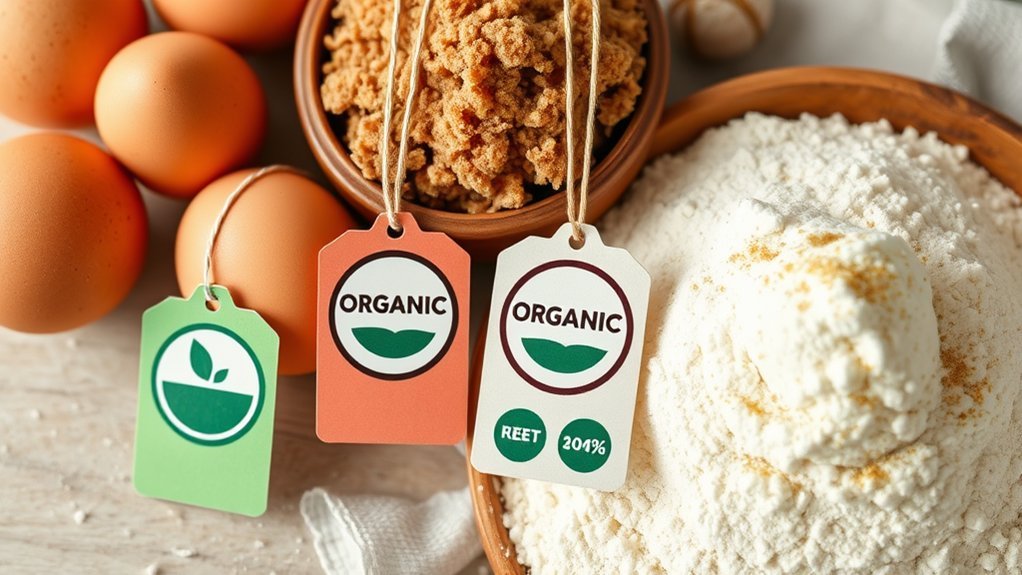
Baking with organic ingredients not only improves the flavour and texture of your cakes but also supports sustainable practices.
Here are some key organic ingredients to consider:
- Flour Types: Opt for organic plain flour for versatility, or choose gluten-free options like almond flour if you have specific dietary needs.
- Sugar Alternatives: Use organic cane sugar or natural sweeteners such as honey for unique flavours and health benefits.
- Dairy Substitutes: Try organic dairy-free oat milk or coconut oil to cater to dietary restrictions while maintaining great taste.
Advantages of Using Organic Ingredients
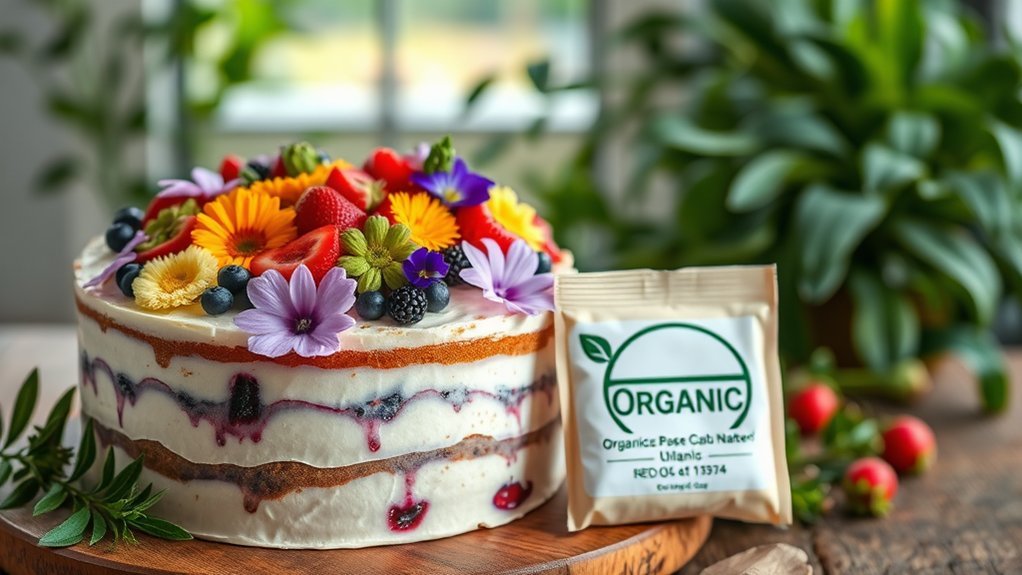
Using organic ingredients in your baking not only elevates the flavour and quality of your cakes but also provides several benefits for your health and the environment.
Organic ingredients are often richer in nutrients, offering more vitamins and minerals, such as vitamin C and magnesium, which can support your overall well-being. Without chemical additives, the flavours are more vibrant and authentic, making your baked goods truly stand out.
Furthermore, organic farming practices help maintain natural nutrients while reducing exposure to harmful pesticides and GMOs. By opting for organic, you ensure a cleaner, safer choice for those you serve, promoting both personal health and environmental sustainability.
Current Trends in Organic Baking Certifications
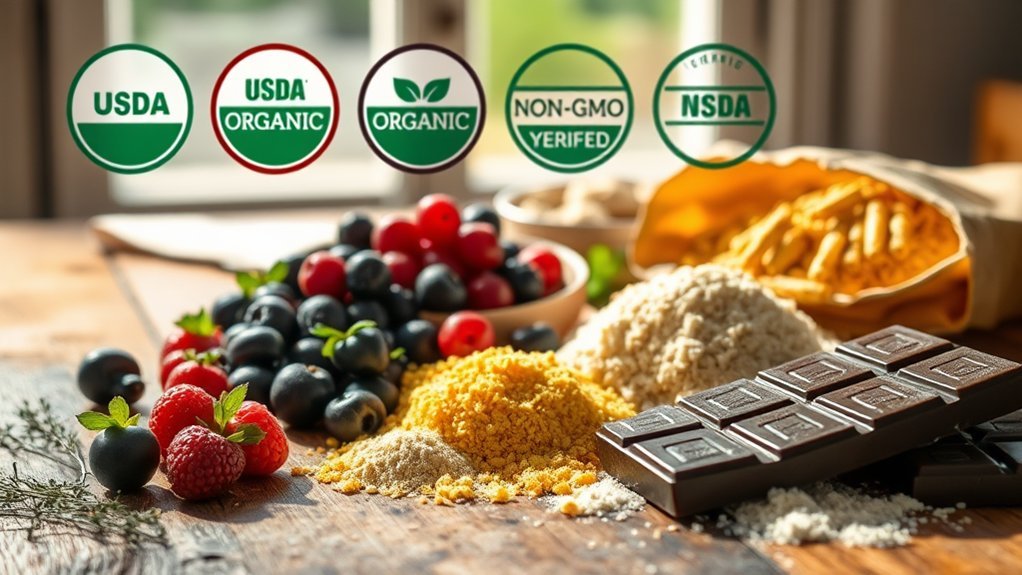
As demand for organic products continues to grow, the realm of organic baking certifications is changing quickly.
Here are three key trends currently shaping this area:
- Emerging Certifiers: New certifying bodies are gaining popularity, emphasising ethical practices that resonate with environmentally conscious consumers.
- Increased Transparency: Brands are opting for certifiers that showcase accountability and clarity in their processes, building consumer trust.
- Regulatory Changes: Upcoming regulations, such as mandatory testing for contaminants, could reshape certification standards and influence product offerings.
These trends highlight a rising expectation for integrity in the organic baking industry, aligning certification choices with consumer values.
As you adapt to these changes, think about how these evolving standards can strengthen your commitment to providing quality organic baked goods.
Frequently Asked Questions
How Do I Find Certified Organic Suppliers for Baking Ingredients?
To find certified organic suppliers for baking ingredients, check out organic supplier directories and local farmers’ markets. These resources can connect you with trustworthy suppliers, helping you source high-quality ingredients that match your dedication to organic baking. For instance, look for local co-ops or online platforms that specialise in organic produce.
What Is the Cost of Organic Certification for Small Businesses?
The cost of organic certification for small businesses in the UK typically ranges from £1,000 to £3,000. By carefully budgeting and considering cost-sharing initiatives, you can ensure that this investment pays off in the organic market. For example, collaborating with other local producers can help spread costs and enhance your market presence.
Can Non-Organic Ingredients Be Used in Organic Baking?
Yes, non-organic ingredients can be used in organic baking, but only under certain regulations. While this may present some challenges, there are solutions available to ensure you remain compliant without compromising on quality. For example, if you struggle to find organic flour, using a small amount of non-organic flour might be permissible, provided it meets the guidelines. The key is to stay informed and make choices that uphold the integrity of your baked goods.
Are Organic Certifications Recognized Internationally?
Organic certifications often enjoy international recognition due to established global standards. Many countries respect each other’s certifications, which means your organic products can be exported with ease. For instance, if you have a UK organic certification, it may be recognised in the EU and other countries, making it simpler to reach a wider market.
How Often Do Farms Need to Renew Their Organic Certification?
You need to renew your organic certification every year. To do this, submit your renewal application at least three months before it expires. You’ll also need to update your Organic System Plan and resolve any compliance issues that may arise during inspections.
Conclusion
In cake baking, selecting the right organic certifications is crucial—it reflects your commitment to quality and sustainability. By opting for trusted labels, you’re not only enhancing your baked goods but also supporting a healthier planet. When you use organic ingredients, each slice becomes a delightful blend of flavour and ethics. Embrace these organic certifications, and you’ll be creating cakes that contribute to a legacy of mindful indulgence for future generations.

